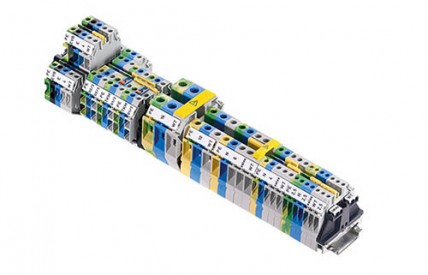- Home
- About
- Products
- Product Testing
- Application
- Services
- Information
- Contact
Views: 2812 Author: Site Editor Publish Time: 2021-01-04 Origin: Site

In 1928, Phoenix Contact invented the world's first modular terminal block. This is the prototype of modern terminals. It is also the first invention patent filed and obtained by Phoenix Contact. Since then, Phoenix Contact has passionately innovated, devoted to the development of various connection technologies, and formed a complete electrical interface technology system. Many of these product series have become the industry's application standards and are widely used in various types of connection occasion including industrial control cabinets and electrical cabinets. European terminal blocks, as their name implies, are terminal blocks that are manufactured in accordance with European standards and have passed the corresponding certification tests.
The European terminal block is a combination of low voltage disconnected connectors and terminal blocks. It is commonly used for microphones and linear-level audio signals, and for control signals such as RS-232 and RS-485. European terminal blocks are also called plug-in terminals or two-piece terminal boxes.
The European type terminal is a solderless connection that uses a screw terminal to clamp the connection line. Once the wires are installed, plug the entire assembly into the mating electrical appliance. European terminal blocks are more convenient than the signal cables they replace because they can be quickly disconnected or connected to electronic equipment instead of unscrewing and re-tightening the individual terminal strips of each wire.
RS-232 is the serial data communication interface standard developed by the American Electronics Industry Alliance. It is widely used in computer serial interface peripheral connections. Commonly used electrical standards are EIA-RS-422-A, EIA-RS-423A, and EIA-RS-485. Currently, the COM1 and COM2 interfaces on the IBM PC are RS-232C interfaces. RS-232 specifies electrical characteristics, logic levels, and various signal line functions.
EIA-485 used to be called RS-485, and it is the standard for multi-point communication with 2-wire, half-duplex, balanced transmission lines. It is a standard jointly issued by the Telecommunications Industry Association and the Electronics Industry Alliance. Digital communication networks that implement this standard can carry out long-range and efficient communications in environments with electronic noise. In a linear multidrop bus configuration, there can be multiple receivers on a network. It is therefore suitable for use in industrial environments.
The current rating of components in Europe is determined by monitoring the temperature of the metal conductor as the current increases. When the temperature of the metal conductor is 45 ° C higher than the ambient temperature, the surveyor takes the current at this time as the rated current value of the device. In contrast, the UL standard will make the current value of the metal conductor 90% higher than the ambient temperature at 90% as the nominal current value of the device.
The temperature of the metal conductor section is a very important factor in all applications. This is even more important for industrial equipment, as industrial equipment typically needs to work in temperatures up to 80 ° C. If the temperature of the terminal block is 30 ° C or 45 ° C higher than environmental temperature, the temperature of the terminal block will exceed 100 ° C. Depending on the nominal value type and insulation material used for the selected device, the products must operate at a current below the rated value in order to ensure that they can work reliably within the desired temperature range. Sometimes, materials suitable for compact packaged devices may not meet the heat dissipation requirements well, so the current used by such terminal block devices must be significantly lower than the rated value.
With the globalization of enterprises, it is necessary to design systems that can be sold globally, so system designers are increasingly using terminal products made in other countries. Because nominal measurement methods are used in Europe, it is common in Europe for devices to be used below the nominal value in the design. However, many designers in the United States are not familiar with this concept. Without understanding the differences between the standards, many problems will occur in the design and use process.
Hopefully, this passage can be helpful when you want to learn about European terminal blocks.